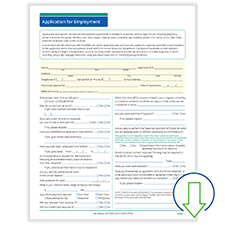
Disciplining or terminating problematic employees is never easy, but it’s an inevitable part of running a business. And when you’re faced with these challenging situations, you must tread carefully to avoid legal missteps.
Following appropriate discipline and dismissal procedures is important, but so is knowing the employee’s status. Is the employee at-will or contracted? Check out the following FAQS to clear up any confusion regarding this critical distinction.
1. What is an at-will employee?
At-will employment, in its simplest terms, means an employee can be terminated at any time for almost any reason, with or without an explanation or warning. At the same time, it also means an employee is free to quit without reason. As a business owner, you can walk up to any at-will employee and say, “I don’t like your attitude. You’re fired.” Nothing more is required other than escorting the employee out of the building. If the termination doesn’t violate employee rights or labor laws, you’re free to fire at-will employees whenever you deem it appropriate.
2. What are the limitations of at-will employment?
Despite this apparent ambiguity with at-will status, numerous federal and state laws restrict employers’ abilities to fire at-will employees. Employees cannot be fired if the termination:
- Violates the terms of an implied contract of employment, which often occurs when a statement or document from the employer creates an intentional or unintentional formal contract
- Intends to prevent the employee from receiving a benefit that has been earned or about to be earned, like an annual bonus or vesting in a pension plan
- Relates to something public policy encourages or permits, such as taking time off for jury duty or to vote
Termination for the reasons listed above is considered “wrongful termination.” In addition, employees cannot be terminated for reasons related to protected classes, such as age, race, color, national origin, religion, gender, disability, pregnancy, citizenship, veteran status, genetic information and more.
To avoid complications, be clear when employment status is at-will and include an at-will disclaimer on your job application.
3. What is the difference between an at-will employee and a contractual employee?
Contract employees function differently because a contract exists for employment, whether it be a collective- bargaining agreement, executive compensation agreement or any other form of binding commitment between the employee and employer. Contracts usually indicate a starting date, compensation plan, benefits and how/why an employee can be terminated. Because of this, failure to adhere to the contract allows either party to sue for damages.
4. Are contracts always written?
No. Employers can sometimes create employment contracts without meaning to. Implied contacts occur when employers promise employees something, like job security. Saying something like, “after 90 days, you will become a permanent employee” to a new hire can be considered an implied contract.
5. Can I terminate a contract employee?
Yes. Employees with an express written contract must abide by the terms of the agreement. If they don’t, they can be fired. A contract usually specifies how the employee can and can’t be discharged. Most employment contracts only allow an employee to be terminated for “good cause” — such as poor work performance, violating company rules and threats of violence. But again, you can’t terminate for illegal reasons related to protected classes.
6. What’s the best way to avoid legal complications when disciplining or terminating an employee?
Document everything clearly and consistently for every employee — whether at-will or contract. For employees to succeed with “wrongful termination” claims, they must prove the employer based a firing decision on an illegal factor, such as age or racial discrimination, a labor law violation or retaliation. In most lawsuits challenging an employment decision, your business is more likely to prevail if your records demonstrate a legitimate business reason for your actions. For example, if an employee alleges unlawful termination based on age, but your records support termination for repeated violation of a company policy, you have a stronger defense to that claim.
Consistency is Key
Employee discipline and termination must be handled carefully. The Progressive Discipline Smart App helps streamline the process so you can proceed confidently and legally — for both at-will and contract employees. The web-based app ensures consistency, creates an essential paper trail and, most important, keeps you in compliance so you’re protected from possible legal disputes.






 Shopping cart
Shopping cart













